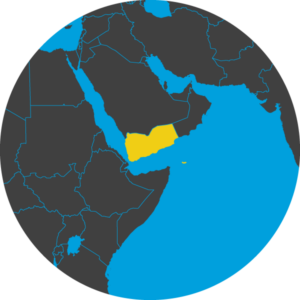Due to sensitivities, the name/s of the partner or partner staff will not be shared in this story.

As one of the most food-insecure countries in the world, the statistics on hunger in Yemen are deeply concerning. In 2023, a staggering 80 per cent of the country’s residents struggled to put food on the table, while two-thirds of Yemen’s population required humanitarian assistance.
The compounding effects of an eight-year long conflict, a collapsed economy, as well as disrupted public services have led to severe rates of malnutrition and hunger, continued displacement, widespread poverty and increasing desperation.
This is especially the case in Taiz Governate, where Emergency Relief and Development Overseas (ERDO) is supporting food assistance programming, implemented through their local partner in Yemen.
For many people like Ibrahim*, who lives with his 10 family members in Taiz, the food security situation continued to degrade due to prolonged economic crisis from the war. Despite his old age Ibrahim still worked, but it was a measly wage, and not enough to cover his family’s expenses or his daughter’s school fees.
Before he was able to access humanitarian assistance, Ibrahim had to choose between food for his family or education for his daughters.
“If I pay my small daily wage to the school, we will not be able to eat. I sometimes fast to leave more food for my children, who already only eat a small amount, which is unable to fill them,” he told ERDO’s local implementing partner.
Unable to afford any electricity in their house, or necessary medicines for his family, life became increasingly difficult for Ibrahim, who was no closer to achieving his long-held dream of purchasing a light for their home.
In response to the increasing need, ERDO’s local partner provided 1,050 households with food assistance for seven months between March and September 2023 in the southern region of Taiz governorate. These food packages included wheat flour, canned beans, vegetable oil, sugar and salt.
Following that project, the team is now working in the southern region of Taiz Governate to provide six months of food assistance for 1,192 households (7,400 people), allowing families time and opportunity to find their own means to sustain themselves.
With the extra support, Ibrahim no longer had to choose between food for his family or education for his daughters. His family’s future became a little brighter.
“Since we have been supplied with the food, our situation has changed for the better,” said Ibrahim. “We and our children are able to eat full meals again that fill our stomachs.”
As a father, seeing the change in his children’s lives since the family started participating in the program was especially rewarding.
“My kids also started to grow and develop better than before. I was able to pay the school fees that helped my daughters to continue their education. I was even able to buy a light for my house, which I was dreaming about for a long time. This organization is the happiness organization!”
It is these stories of transformation, expressions of gratitude and positive feedback that are a key source of ongoing inspiration and motivation for local implementing staff, says Jonathan, the program’s humanitarian aid coordinator.
Fortunately, the team is able to see much of the impact of their efforts as they purposely contribute to positive change in their country.”
But it isn’t easy work. As well as staff investing in themselves through capacity development initiatives and other trainings, team members are regularly supported with psychosocial support sessions to help them cope with and process what they constantly experience when working in the field.
Their diligence to persevere in delivering such important services to communities in need, despite many personal and systematic hardships, is what makes ERDO’s local implementing partner staff especially proud of their team.
“As one might imagine, they have faced numerous and varied challenges working in a conflict environment over eight years of war and displacement,” says Jonathan. “It has become somewhat ‘normal’ even to deal with such difficult circumstances while serving vulnerable and desperate communities with food, livelihood support and other important types of assistance.
“Fortunately, the team is able to see much of the impact of their efforts as they purposely contribute to positive change in their country.”
Now, they’re not just focusing on the provision of humanitarian assistance, and the impact for today, but also creating a stronger future for tomorrow.
“It is becoming more and more important to ensure those we are supporting are empowered to build or revive their own means of food security. This is why we are increasing our livelihood-based programming. With the support of Canadian Foodgrains Bank, we are not only making great inroads, but we are even pioneering some approaches in the country!”
As we work to end global hunger through our 15 member organizations and their local partners, we’re so grateful for people on the frontlines of the hunger crisis like the team in Yemen.
*pseudonym.
This story was originally published in the 2024 Winter edition of Breaking Bread. Download or order your copy here.